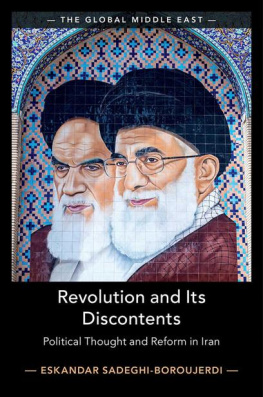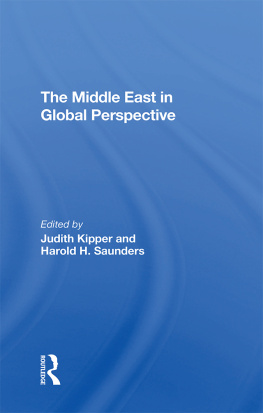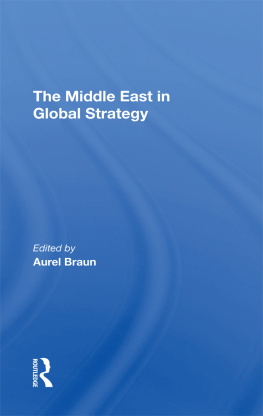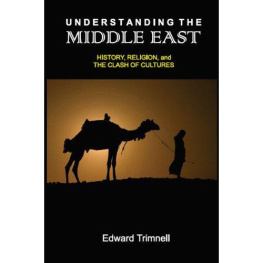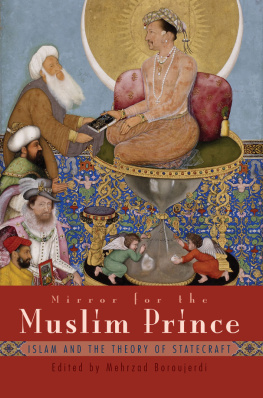Eskandar Sadeghi-Boroujerdi - Revolution and Its Discontents: 7 (The Global Middle East)
Here you can read online Eskandar Sadeghi-Boroujerdi - Revolution and Its Discontents: 7 (The Global Middle East) full text of the book (entire story) in english for free. Download pdf and epub, get meaning, cover and reviews about this ebook. year: 2019, publisher: Cambridge University Press, genre: Politics. Description of the work, (preface) as well as reviews are available. Best literature library LitArk.com created for fans of good reading and offers a wide selection of genres:
Romance novel
Science fiction
Adventure
Detective
Science
History
Home and family
Prose
Art
Politics
Computer
Non-fiction
Religion
Business
Children
Humor
Choose a favorite category and find really read worthwhile books. Enjoy immersion in the world of imagination, feel the emotions of the characters or learn something new for yourself, make an fascinating discovery.
- Book:Revolution and Its Discontents: 7 (The Global Middle East)
- Author:
- Publisher:Cambridge University Press
- Genre:
- Year:2019
- Rating:4 / 5
- Favourites:Add to favourites
- Your mark:
- 80
- 1
- 2
- 3
- 4
- 5
Revolution and Its Discontents: 7 (The Global Middle East): summary, description and annotation
We offer to read an annotation, description, summary or preface (depends on what the author of the book "Revolution and Its Discontents: 7 (The Global Middle East)" wrote himself). If you haven't found the necessary information about the book — write in the comments, we will try to find it.
Revolution and Its Discontents: 7 (The Global Middle East) — read online for free the complete book (whole text) full work
Below is the text of the book, divided by pages. System saving the place of the last page read, allows you to conveniently read the book "Revolution and Its Discontents: 7 (The Global Middle East)" online for free, without having to search again every time where you left off. Put a bookmark, and you can go to the page where you finished reading at any time.
Font size:
Interval:
Bookmark:
Revolution and Its Discontents
The death of the Islamic Republics revolutionary patriarch Ayatollah Khomeini, the bitter denouement of the IranIraq War, and marginalisation of leading factions within the political elite, in tandem with the end of the Cold War, harboured immense intellectual and political repercussions for the Iranian state and society. It was these events which created the conditions for the emergence of Irans post-revolutionary reform movement, as its intellectuals and political leaders sought to re-evaluate the foundations of the Islamic states political legitimacy and religious authority. In this monograph, Sadeghi-Boroujerdi examines the rise and evolution of reformist political thought in Iran and analyses the complex network of publications, study circles, and think tanks that encompassed a range of prominent politicians and intellectuals in the 1990s. In his meticulous account of the relationships between the post-revolutionary political class and intelligentsia, he explores a panoply of political and ideological issues still vital to understanding Irans revolutionary state, such as the ruling political theology of the Guardianship of the Jurist, the political elites engagement with questions of Islamic statehood, democracy, and constitutionalism, and their critiques of revolutionary agency and social transformation.
Eskandar Sadeghi-Boroujerdi is a British Academy Postdoctoral Research Fellow in the Faculty of Oriental Studies at the University of Oxford and Postdoctoral Associate at St Cross College, Oxford. He has taught at the University of Oxford, SOAS (University of London), and the University of Exeter. Sadeghi-Boroujerdi was Associate Editor at the British Journal of Middle Eastern Studies from 2014 to 2017 and is Series Editor of Radical Histories of the Middle East . His writings on Iran have been widely published in academic journals and the international media, including the British Journal of Middle Eastern Studies, Iranian Studies, Digest of Middle East Studies, Middle East Journal, Foreign Policy, Jadaliyya, Al Jazeera, Lobelog, Muftah, Jacobin , and The Guardian .
Arshin Adib-Moghaddam, SOAS, University of London
Ali Mirsepassi, New York University
Faisal Devji, University of Oxford
John Hobson, University of Sheffield
Firoozeh Kashani-Sabet, University of Pennsylvania
Zachary Lockman, New York University
Madawi Al-Rasheed, London School of Economics and Political Science
David Ryan, University College Cork, Ireland
The Global Middle East series seeks to broaden and deconstruct the geographical boundaries of the Middle East as a concept to include North Africa, Central and South Asia, and diaspora communities in Western Europe and North America. The series features fresh scholarship that employs theoretically rigorous and innovative methodological frameworks resonating across relevant disciplines in the humanities and the social sciences. In particular, the general editors welcome approaches that focus on mobility, the erosion of nation-state structures, travelling ideas and theories, transcendental techno-politics, the decentralisation of grand narratives, and the dislocation of ideologies inspired by popular movements. The series will also consider translations of works by authors in these regions whose ideas are salient to global scholarly trends but have yet to be introduced to the Anglophone academy.
Revolution and Its Discontents
Political Thought and Reform in Iran
Eskandar Sadeghi-Boroujerdi
University of Oxford


University Printing House, Cambridge CB2 8BS, United Kingdom
One Liberty Plaza, 20th Floor, New York, NY 10006, USA
477 Williamstown Road, Port Melbourne, VIC 3207, Australia
314321, 3rd Floor, Plot 3, Splendor Forum, Jasola District Centre, New Delhi 110025, India
79 Anson Road, #0604/06, Singapore 079906
Cambridge University Press is part of the University of Cambridge.
It furthers the Universitys mission by disseminating knowledge in the pursuit of education, learning, and research at the highest international levels of excellence.
www.cambridge.org
Information on this title: www.cambridge.org/9781108426343
DOI: 10.1017/9781108681834
Eskandar Sadeghi-Boroujerdi 2019
This publication is in copyright. Subject to statutory exception and to the provisions of relevant collective licensing agreements, no reproduction of any part may take place without the written permission of Cambridge University Press.
First published 2019
Printed and bound in Great Britain by Clays Ltd, Elcograf S.p.A.
A catalogue record for this publication is available from the British Library.
Library of Congress Cataloging-in-Publication Data
Names: Sadeghi-Boroujerdi, Eskandar, 1982- author.
Title: Revolution and its discontents : political thought and reform in Iran / Eskandar Sadeghi-Boroujerdi, University of Oxford.
Description: Cambridge, United Kingdom ; New York, NY, USA : Cambridge University Press, [2019] | Includes bibliographical references and index.
Identifiers: LCCN 2018041015 | ISBN 9781108426343
Subjects: LCSH: Iran Politics and government 19791997. | Iran Politics and government 1997 | Political culture Iran. | Social change Political aspects Iran.
Classification: LCC DS318.825 .S233 2019 | DDC 955.05/4dc23
LC record available at https://lccn.loc.gov/2018041015
ISBN 978-1-108-42634-3 Hardback
Cambridge University Press has no responsibility for the persistence or accuracy of URLs for external or third-party Internet websites referred to in this publication and does not guarantee that any content on such websites is, or will remain, accurate or appropriate.
To my parents
&
Homa Katouzian
I would first like to thank Homa Katouzian, my mentor and doctoral supervisor at the University of Oxford. He was never short of time, advice, or support and was always ready to help in any way possible. I simply cannot express sufficient gratitude for his abundant kindness, integrity, and generosity of spirit, as well as the example he has set as both a scholar and human being, all of which have indelibly left their mark.
I must profusely thank Ali Ansari and Faisal Devji, whose incisive comments and provocative questions in the course of my viva voce upon which this work is based were invaluable and helped me to improve this modest piece of research. Both have been a generous source of support and encouragement, indispensable to any early career scholar and their development. Nasser Mohajer is also in need of special thanks and has been a brilliant source of advice and guidance. He has spent many hours speaking with me and discussing sources, events, and historiography, very often on issues unrelated to the subject of this work. Nonetheless, I believe myself a much better researcher as a result of his positive influence and meticulous intellect, which have enabled me to understand the vicissitudes of twentieth-century Iranian history in a far deeper fashion than I might have done otherwise. He also took great care when reading the chapters I sent for his review and gave comments that were without exception insightful and thought-provoking. They always inspired me to polish and improve those points which were unclear or demanded further elucidation. Siavush Randjbar-Daemi is deserving of profuse thanks and gratitude. He has always and without fail been indefatigable in offering his help, suggestions, and constructive criticism. I feel fortunate to consider him not only a first-rate academic colleague and interlocutor but also a dear friend. Without our constant back-and-forth and intellectual dialogue I would be quite a different historian to the one I am today.
Font size:
Interval:
Bookmark:
Similar books «Revolution and Its Discontents: 7 (The Global Middle East)»
Look at similar books to Revolution and Its Discontents: 7 (The Global Middle East). We have selected literature similar in name and meaning in the hope of providing readers with more options to find new, interesting, not yet read works.
Discussion, reviews of the book Revolution and Its Discontents: 7 (The Global Middle East) and just readers' own opinions. Leave your comments, write what you think about the work, its meaning or the main characters. Specify what exactly you liked and what you didn't like, and why you think so.

